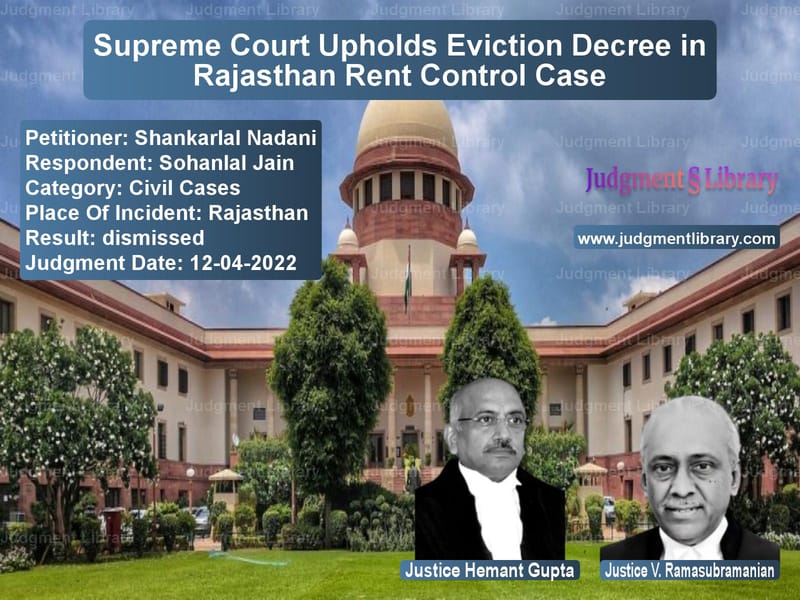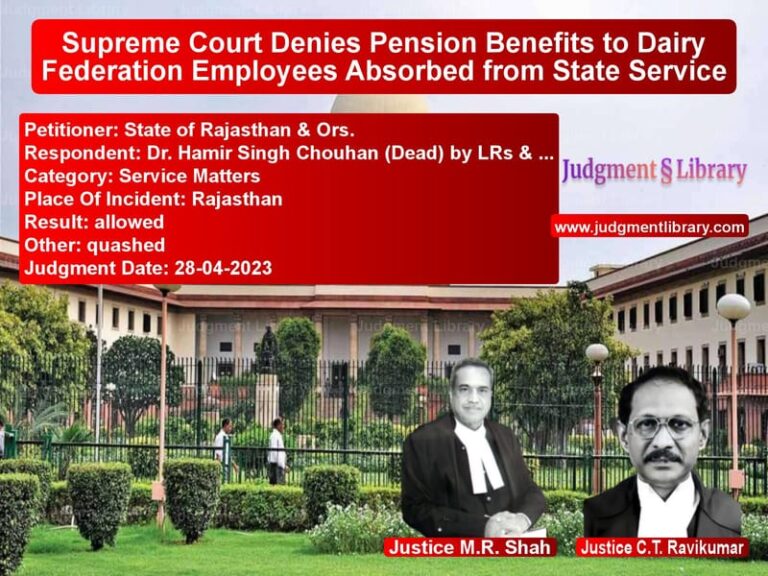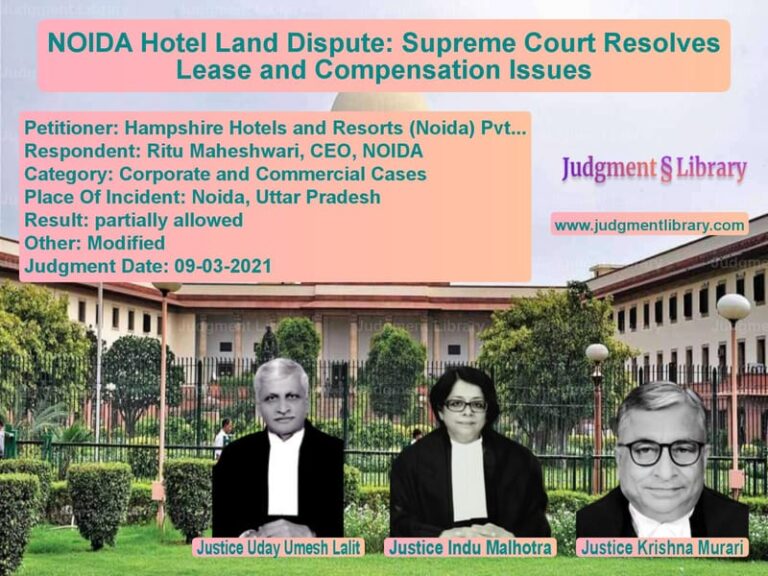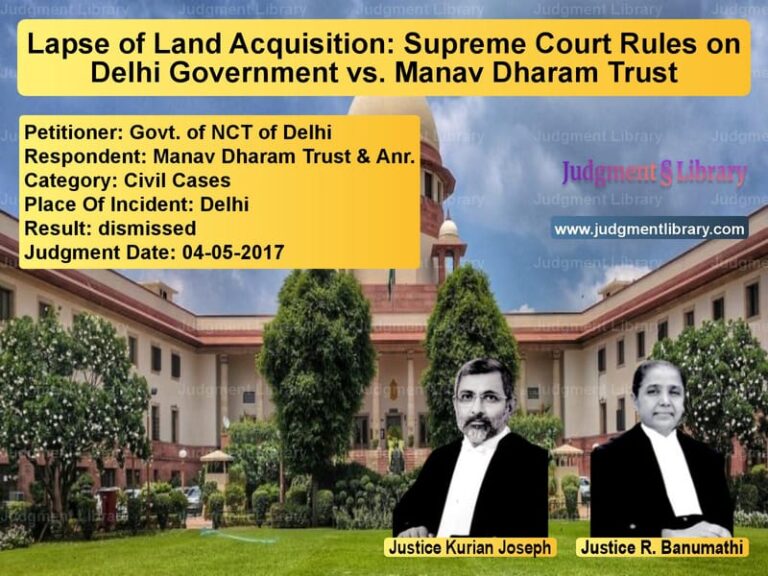Supreme Court Upholds Eviction Decree in Rajasthan Rent Control Case
The Supreme Court of India recently ruled on the case of Shankarlal Nadani vs. Sohanlal Jain, addressing a long-standing dispute over a tenant’s eviction under the Rajasthan Rent Control Act, 2001. The case raised crucial questions about the applicability of the Act to pending civil cases and whether eviction decrees passed before the law came into effect could still be executed.
Background of the Case
The dispute revolved around a shop located at Jain Katla, Bikaner Road, Suratgarh. The appellant’s father had been a tenant in the shop since 1982, paying a monthly rent of Rs. 583.33 to the landlord. After his father’s demise, the appellant continued the tenancy. The respondent, who inherited ownership of the property, filed a suit for possession on April 18, 2013, following a notice of termination of tenancy under Section 106 of the Transfer of Property Act, 1882.
While the case was ongoing, the Rajasthan government issued a notification on July 11, 2014, extending the provisions of the Rajasthan Rent Control Act, 2001 to Suratgarh, effective from May 11, 2015. Despite this, the civil court ruled in favor of the landlord and passed an eviction decree on May 28, 2015. The appellant’s appeals before the Additional District Judge and the Rajasthan High Court were dismissed, prompting him to approach the Supreme Court.
Legal Issues
- Whether the civil court had jurisdiction to pass an eviction decree after the Rajasthan Rent Control Act, 2001, became applicable to Suratgarh.
- Whether the eviction decree passed by the civil court remained valid and executable despite the subsequent application of the Rent Control Act.
- Whether the appellant’s reliance on a pending Special Leave Petition (SLP) in a similar case affected the execution of the decree.
Arguments by the Parties
Appellant’s Arguments
- The appellant contended that after the Rent Control Act was extended to Suratgarh, only the Rent Tribunal had jurisdiction over landlord-tenant disputes.
- He argued that the civil court’s eviction decree was legally invalid as the Act barred such proceedings.
- The appellant relied on a Division Bench judgment of the Rajasthan High Court in K. Ramnarayan Khandelwal vs. Shri Pukhraj Banthiya, which held that eviction decrees passed after the applicability of the Rent Act were unenforceable.
Respondent’s Arguments
- The respondent (landlord) countered that the Rent Control Act does not have retrospective effect and does not nullify eviction decrees already passed by civil courts.
- He pointed out that the High Court had correctly observed that the judgment in K. Ramnarayan Khandelwal was stayed by the Supreme Court, making it non-binding.
- The respondent maintained that the civil court had jurisdiction when the suit was filed, and the tenant could not escape eviction based on a subsequent legal change.
Supreme Court’s Judgment
Key Observations
- The Supreme Court ruled that the Rajasthan Rent Control Act, 2001, did not retrospectively affect eviction decrees passed before its applicability.
- It held that the civil court had valid jurisdiction over the matter when the eviction suit was filed.
- The Court rejected the appellant’s reliance on K. Ramnarayan Khandelwal, noting that the decision had been stayed.
- It emphasized that rights of parties crystallize at the time of filing the suit, and subsequent legal changes do not affect an already passed eviction decree.
Final Decision
The Supreme Court dismissed the appeals and upheld the eviction decree, stating:
“The Rent Tribunal’s jurisdiction is prospective, and it does not affect suits filed before the Act was made applicable to the area in question. The decree passed by the civil court remains valid and executable.”
Implications of the Judgment
For Tenants and Landlords
- The ruling clarifies that tenants cannot use the subsequent extension of Rent Control Acts to escape eviction decrees already passed.
- Landlords can rely on eviction decrees passed by civil courts before rent control laws became applicable in their area.
For the Rajasthan Rent Control Act, 2001
- The judgment reinforces that the Rent Tribunal’s jurisdiction does not apply retrospectively.
- It ensures that the legal framework remains stable and predictable for both tenants and landlords.
For Legal Precedents
- The ruling aligns with earlier Supreme Court decisions that upheld eviction decrees passed before the extension of rent control laws.
- It serves as a reference for similar cases where tenants attempt to contest eviction orders based on later legal developments.
Conclusion
The Supreme Court’s judgment in Shankarlal Nadani vs. Sohanlal Jain reinforces the principle that changes in rent control laws do not retrospectively affect eviction decrees. The ruling ensures that landlords retain their rights to enforce civil court orders, and tenants cannot use subsequent legal changes to delay or evade eviction. This decision sets an important precedent for landlord-tenant disputes across India.
Petitioner Name: Shankarlal Nadani.Respondent Name: Sohanlal Jain.Judgment By: Justice Hemant Gupta, Justice V. Ramasubramanian.Place Of Incident: Rajasthan.Judgment Date: 12-04-2022.
Don’t miss out on the full details! Download the complete judgment in PDF format below and gain valuable insights instantly!
Download Judgment: shankarlal-nadani-vs-sohanlal-jain-supreme-court-of-india-judgment-dated-12-04-2022.pdf
Directly Download Judgment: Directly download this Judgment
See all petitions in Landlord-Tenant Disputes
See all petitions in Property Disputes
See all petitions in Specific Performance
See all petitions in Judgment by Hemant Gupta
See all petitions in Judgment by V. Ramasubramanian
See all petitions in dismissed
See all petitions in supreme court of India judgments April 2022
See all petitions in 2022 judgments
See all posts in Civil Cases Category
See all allowed petitions in Civil Cases Category
See all Dismissed petitions in Civil Cases Category
See all partially allowed petitions in Civil Cases Category







